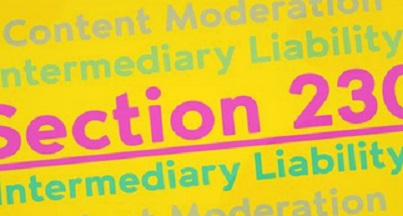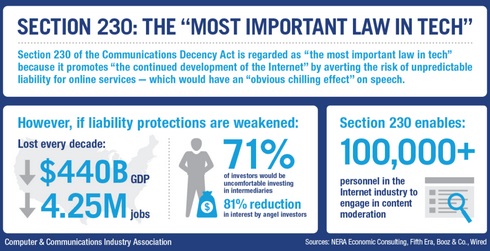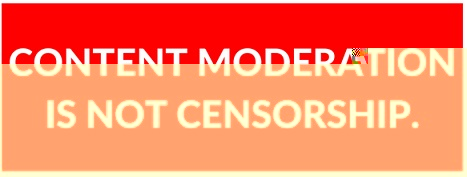Posted On: Saturday - October 31st 2020 4:23PM MST
In Topics: Humor Trump Big-Biz Stupidity Legal Stupidity

Going back 2 weeks to our "The Bad" portion of our series on President Trump, The Bad, the Good and the Ugly, I will excerpt 2 paragraphs that relate specifically to what can be done about Big-"Tech" tyranny. (This was part of a large point about Donald Trump seemingly only acting politically when things get personal for him.)
The problem is that the President doesn't fight when he has the tools to beat the ctrl-left, as brought up by many a smart policy wonk or pundit, unless it hits him. I'm talking right now about Big-Computer-Tech (I'll grudgingly call it "Big Tech" for this post for brevity, but I don't have to like it!) and their censorship. The Constitutional issue of free speech (Amendment I) doesn't limit the actions of private companies. I do get that.I'll just admit right here and now that Peak Stupidity does not have the budget for an expensive legal team. Peak Stupidity's legal
However, you may have read that there are ways to get Big Tech (Facebook and Twitter, specifically), as they basically are seen by law right now as "platforms" rather than "publishers". That makes them immune from liability on libel/slander/consumer protection laws. There is a Section 230 of some Communications Act administered by the FCC. I am no legal eagle, so I will not get into it, but VDare has been for a few years, and one Senator Josh Hawley of Missouri is too.
Therefore, rather than explain Section 230 of the Communications Decency Act of 1934, enforced by the FCC (Federal Communications Commission), we refer you to FCC lawyer Thomas Johnson, Jr. and his statement regarding possible Trump administration action. The nice thing is that this page also has a concise background of the Communication Decency Act as a whole. In 1996 a new Communications Act was passed, which incorporated the 1934 laws but also added new laws for the new thing called the internet. Here's the portion about "interactive computer services" and "information content providers":
Section 230 provides, among other things, that “[n]o provider or user of an interactive computer service shall be treated as the publisher or speaker of any information provided by another information content provider.” It further provides that “[n]o provider or user of an interactive computer service shall be held liable on account of . . . any action voluntarily taken in good faith to restrict access to or availability of material that the provider or user considers to be obscene, lewd, lascivious, filthy, excessively violent, harassing, or otherwise objectionable, whether or not such material is constitutionally protected.” The term “interactive computer service” is defined “as any information service, system, or access software provider that provides or enables computer access by multiple users to a computer server, including specifically a service or system that provides access to the Internet and such systems operated or services offered by libraries or educational institutions.” That broad definition is commonly understood to include websites that host or moderate content generated by others, such as social media companies.[Peak Stupidity's bolding there]
That was pretty on-the-ball for 1996, when most of us were just using the internet for searching for nude photos of Claudia Schiffer. The internet wasn't even big enough for more than a couple of dozen funny kitten videos. I give credit to some forward thinking congressmen, who probably were given nice donations by forward thinking geeks.
Let me give an example of what the law's about. If Peak Stupidity were to just claim that Joe Biden, working his lifeguarding job, had molested 2 young black boys at the swimming pool, making them call him Corn Pop during the process, well, we could be sued ... had we any money at all. However, in the comments section, since it's open to anyone, we are supposed to do our best to clean up comments, but only as far as our abilities. Even in 1996, any hack programmer could write a routine to wipe out certain words, or comments with certain words. How could one clean up every bit of libel, though, without reading every post? You don't need to read every post, because you are just a lowly platform, not an erudite publisher who edits stuff and shit.
There should be, and often are, disclaimers to this effect. You know, our legal team here may want to work on that in their small periods of spare time between the efforts drafting up our "we got nothin'" statements. [PLEASE NOTE: WE ARE NOT CLAIMING THAT JOE BIDEN MOLESTED ANY KIDS AND WANTED ANYONE TO CALL HIM "CORN POP"! IT MAY HAVE BEEN "PORN COP" THOUGH. - PS Legal] See, now this is what I get from the PS legal pigeons, uhhh,... problem is that this note was written by an intern, and why fire an intern, he doesn't care.
[The intern responsible for that erroneous statement regarding our purely hypothetical wording about Joe Biden, written for instructional purposes, has been severely reprimanded and is on still-unpaid leave. I am the new intern, and believe me, you'll get some quality here, as I have been promised to be promoted to a paid position "just as soon as COVID-19 has been completely eradicated, so that we don't have to spend money to keep supplying the staff with
Now comes a real digression. Going back to those early internet times, the reader may recall that sales taxes were also an issue that came up. The internet companies that began selling everything one could think of under and even out of the sun (iDouche.com, wasn't that one of them?), with support from $100 million IPO issues didn't want the customers to have to pay sales tax. Really, at the beginning, there was probably not even an electronic "mechanism" to collect the tax.
I just read in this 2018 Forbes article that a 1992(!) Supreme Court ruling, Quill Corporation v N. Dakota, that sales tax must only be collected if the company selling a product had a physical presence in the State where the buyer resided (but, really, I guess where he had the stuff shipped to). For Amazon, pretty early on (2000) that meant just Washington and Delaware, but soon enough Kentucky, Nevada, and Kansas with new, huge warehouses in those States. I really don't know if this made total sense or not, but the customers were cool with it, and my view is that anything but a head tax is better than income tax, State or Federal*. (Actually, I shouldn't write too soon on this - they'll think of something.)
It turns out that in 2018, in South Dakota v. Wayfair, Inc., the Supreme Court changed their Constitutional interpretation (at least this WAS an actual Constitutional issue). Tax is now collected, no matter where you are. (I had first thought that it was just that Amazon is present pretty much everywhere anyway, which they are.)
Digression over with, Section 230 of the Communications Act of 1996 is another cut-out, like the sales tax thing early on, to give internet companies a break. It is completely understandable, don't get me wrong, but it's a BENEFIT to the blogs, Twitters, Instagrams, Facebooks, etc. The threat to remove Section 230 protection is no illegal move by a banana-republic strongman, though. They have simply been acting as publishers, NOT as platforms.
If you are a platform, as I wrote, you are supposed to make an effort to remove indecent writing and pictures, but then indecency has changed a whole lot since 1996. Anything goes now, so I will submit that these publishers in the guise of platforms are not even doing much of that. Fine, standards have changed. However, can your "platform" really get away with deciding that your software, or live humans (but let me get back to that), must eliminate comments, messages, pages, tweets, whatever that has certain political opinions? Maybe, software-wise, one looks for "Trump, Hunter Biden, China, under-age" and combinations like this. Where something like this comes under "obscene, lewd, lascivious, filthy, excessively violent, harassing, or otherwise objectionable." is open to interpretation, the last 2 terms especially. Can it be one-sided, as it is now?
Live humans are obviously programming in the censorship, or inserting the "unsuitable" words or phrasing into some database, and they may even be doing some of this more manually. Is that not what a publisher does, this editing?

You brought it on yourselves, bitches.
I'm getting lost a bit now, so let me just excerpt the point of the FCC statement linked-to above, from the Trump Administration FCC paid lawyer, Thomas M. Johnson, Jr.:
Last week, FCC Chairman Ajit Pai announced his intent to move forward with a rulemaking to interpret Section 230 of the Communications Act of 1934. Under certain circumstances, Section 230 provides websites, including social media companies, that host or moderate content generated by others with immunity from liability. In announcing his decision, Chairman Pai noted that “[m]embers of all three branches of government have expressed serious concern about the prevailing interpretation” of Section 230, and observed that an overly broad interpretation could “shield[] social media companies from consumer protection laws in a way that has no basis in the text” of the statute.....
And like the jurisdictional and preemption provisions, Section 230 contains ambiguous terms: What constitutes an action “voluntarily taken in good faith” to restrict access to material? What constitutes material that can be excluded as “otherwise objectionable”? As in City of Arlington and City of Portland, the Commission has the authority to clarify these ambiguities in Section 230. As the Supreme Court observed in Iowa Utilities Board, this conclusion is nothing more than application of the general principle, derived from the Supreme Court’s landmark decision in Chevron U.S.A., Inc. v. Natural Resources Defense Council, Inc., 467 U.S. 837 (1984), that “Congress is well aware that the ambiguities it chooses to produce in a statute will be resolved by the implementing agency.”That would be the FCC administered by people selected President Donald Trump (for NOW!)

Maybe, if President Trump gets re-elected, he will not forget how he has been treated by Big-"Tech" and even think about the rest of us in this matter. It will be HIGH TIME for the Trump FCC, with hopefully no swamp creature in charge, along with the more Conservative Supreme Court** to re-interpret Section 230 with extreme prejudice.
PS: Man, this post ended up 5 X longer than I had intended. I just enjoy inserting the humor and get carried away. For some readers that may be a turn off, so I apologize.
* See also Part 2 and Part 3.
** We got 2 and then 1 more in the nick of time. Of course they could all go native by some point, but getting to pick 3 in 4 years worked out pretty well. Maybe Kagan and OscarMayer will both rethink their life goals and resign to head up women's softball leagues or something.
Comments:
Moderator
Monday - November 2nd 2020 1:17PM MST
PS: For whatever reason, Adam, maybe also their finance people, Eagles songs have been hard to come by on youtube over the years right up through recently. In particular, I still never was able to get "The Greeks Don't Want no Freaks".
You are so helpful, but you don't have to check for me. If it's there, I'll see if I can remember the quick post I meant to write long ago, with that song embedded.
You are so helpful, but you don't have to check for me. If it's there, I'll see if I can remember the quick post I meant to write long ago, with that song embedded.
Adam Smith
Monday - November 2nd 2020 7:22AM MST
PS: Yes, you can still get a judgement with no expectation or chance of getting paid, if you want to.
As most artists are getting screwed by their contract and record company, and just happy someone is listening to their work, it wasn't really the artists doing much of the fighting... (Except for Lars Ulrich.)
☮
As most artists are getting screwed by their contract and record company, and just happy someone is listening to their work, it wasn't really the artists doing much of the fighting... (Except for Lars Ulrich.)
☮
Moderator
Sunday - November 1st 2020 7:34PM MST
PS: Can't you still get a judgement just to prove a point or make precedent, even if you'll never get any money?
I always thought it was hilarious on youtube music videos. I guess youtube or the artists just gave up fighting that stuff.
I always thought it was hilarious on youtube music videos. I guess youtube or the artists just gave up fighting that stuff.
Adam Smith
Sunday - November 1st 2020 4:26PM MST
PS: "Don't sue us. We own NOTHING!"
There are advantages in being judgement proof.
☮
There are advantages in being judgement proof.
☮
How about this one?
https://www.youtube.com/watch?v=bEiDPGoMhMw
Or, you could embed this and use start and stop tags...
https://www.youtube.com/watch?v=4fQ2epFQG9g
I guess you could download it from youtube and upload it to bitchute, but then you'd have to learn how to embed bitchute videos. (Which might not be a bad idea.)
I should have said small artists. (Even some seemingly successful artists who are not huge.) I've heard of small bands who get a record deal, sign a contract, sell a couple hundred thousand albums, go on tour, and still owe the company big money. The business can destroy a small band.
Bands like the Eagles and Metallica get a much better deal than smaller artists. I think it was easier to get a better deal from a traditional record company years ago.
Fortunately, nowadays it's easier than ever to record yourself and post to places like youtube. Unfortunately, most youtubers don't make the money they used to.
https://bandzoogle.com/blog/record-sales-where-does-the-money-go
I've never heard of bandzoogle before, and I'm not trying to promote or endorse them, but that page gives a pretty quick breakdown of where the money goes and who gets what.
https://i.postimg.cc/x16GWyLX/Myama-Shave.jpg
☮